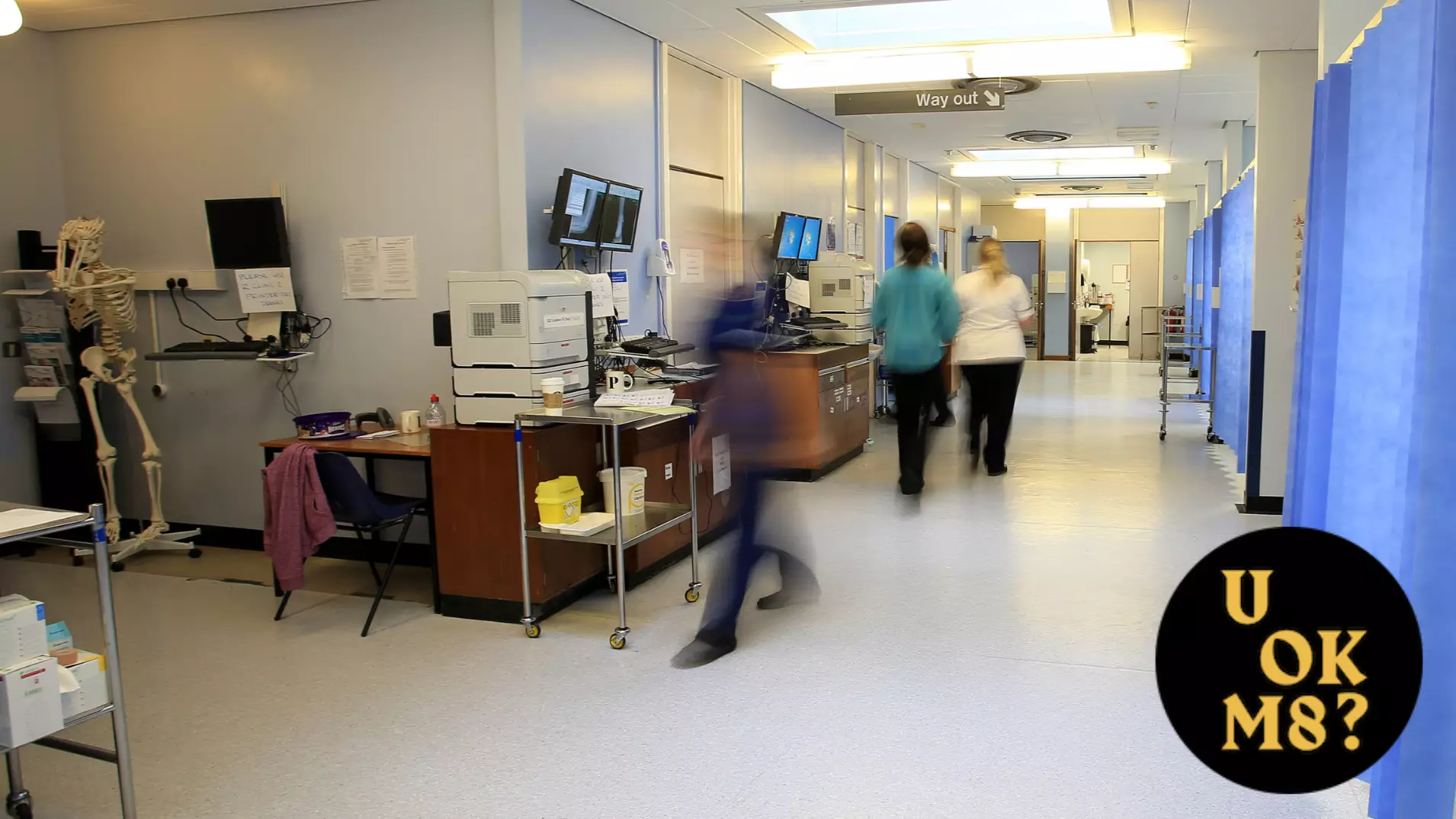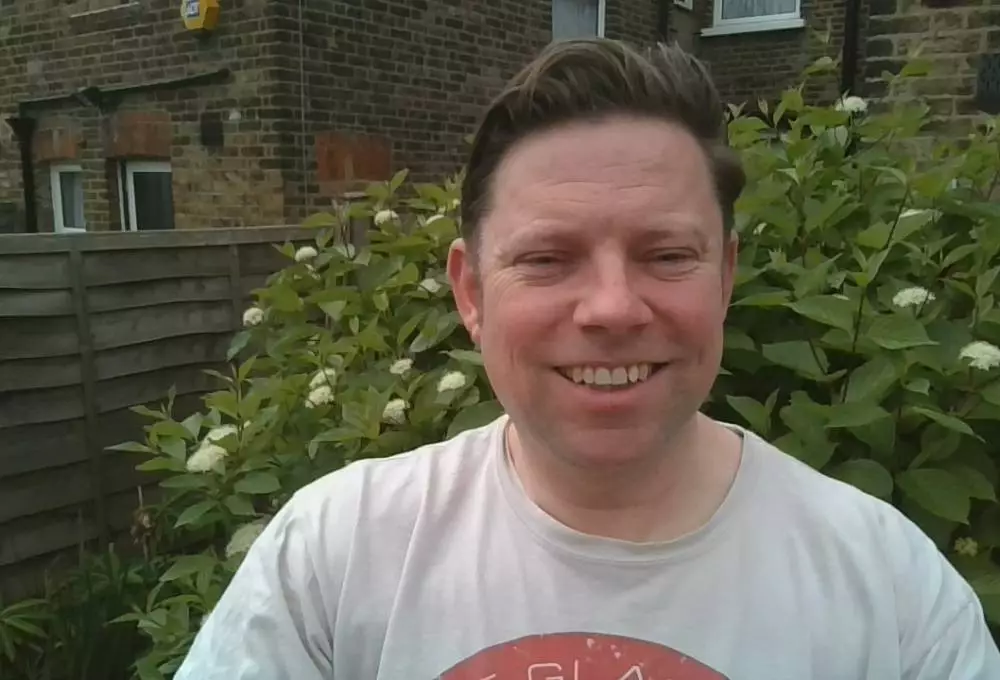
The conversation around mental health has never been more public - but what effect is it having on those at the front line of care?
One man heavily involved in the sector says it is creaking under the pressure of relentless cuts, reduced numbers of staff and the toll it takes on carers.
Speaking to LADbible, Laurie Dahl, who is now Senior Lecturer in Mental Health Nursing at Kingston University and St George's, said: "As wonderful as it can be working with people at their lowest point and caring and trying to help them, it can be a difficult job at times."
Advert

An understatement of sorts - horrifying figures released earlier this year showed that more than 300 nurses have killed themselves in seven years.
According to the Office for National Statistics, 304 nurses who work for the NHS across all disciplines took their own life between 2011 and 2017. During the worst year in 2014, it can be seen that one nurse was a victim every single week.
"Mental health nurses can work with people who've experienced awful lives and distressing trauma and one has to find a way of dealing with that without letting it get to you, at times that's easier said than done.
Advert
"On my ward sometimes distressed service users would have my staff crying with them. That can be powerful, as long as the nurses can hold that distress without it affecting them negatively."
But what is it about the 'caring profession' that is leaving so many health workers, of all ages, feeling so desperate that they feel this is the only option for them?
Causes can be wide and varied; the issue is extremely complicated. NHS staff are dropping out at a higher rate than ever before, with things like burn-out from staff shortages and lack of support due to cuts in funding being widely cited.
"The cuts in beds have led to the acuity - how ill services users are - at the highest it's been in my nearly 16 years of experience of mental health setting. That means ward staff are dealing with very unwell people, community staff by extension working with iller people and carrying higher levels of risk than ever.
Advert
"All these factors mean nurses are working under at times intolerable stresses. "
People who have suffered with mental illness often want to go into the field to help others like them but can find that caring for others who have had often traumatic experiences can often cause them to relapse after they've recovered.

Laurie says that nursing saved his life, when as a 21-year-old man he started to suffer with mental illness.
Advert
As well as now being involved in the sector on an academic level, he was first introduced to it as a user of its valuable services.
He said: "I experienced my first episodes of psychosis during adolescence. This time often involves increased responsibility, leaving home, new pressures while one is essentially still quite young.
"While any one of these issues may have been manageable, the accumulation of all of them at once tipped me over the edge and I became psychotic and had a series of hospitalisations, once under Section."
After being admitted to hospitals in Stafford, where he studied, as well as a selection of others, Laurie says the care he received was always great, with doctors taking his illness very seriously.
Advert
When Laurie was sectioned, he decided he want to pursue a career in nursing, thanks to the NHS nurses and doctors who treated him.
"I was lucky enough to have had wonderful care from two nurses who were very important to my recovery. They inspired me into nursing. One nurse became a lifelong friend.
"I wanted to give something back to nursing which had built me up, bit by bit, from a point where I wanted to be dead, saw no worth in my life, no future and no hope.
"Seriously - I might not even be alive. Nursing saved my life, gave me a career and a productive life."
Laurie has also managed a team of mental health nurses (RMNs - which stands for Registered Mental Nurses) on an acute ward, where patients are referred to as emergency cases - he was responsible for looking after the health of his own staff, as well as the patients that are referred to him.

"I had staff who were reluctant to seek the sort of help we'd suggest to our service users, even when they were in crisis.
"For example, if aggression and abuse is triggering it is hard for them to cope with that. As a team we did our best to support each other through the extreme stresses that can occur.
"It was a while before I shared my mental health history with all my team. That might seem odd, and I might do things differently if I had my time again. I opened up, or came out as I call it, when I had proved myself to them."
Laurie does find that some of his staff - as he himself did - came with their own issues and histories, with some of them finding it more difficult to deal with the strains of the job because of their own experiences.
It's then his job to make sure they get the support they need, although sometimes the stigma around accepting they themselves feel affected, can make it difficult.
Laurie warns new students the profession is the greatest, but can also be difficult, and although the good outweighs the bad, it can put a strain on mental health - and these pressures are greater than ever at the moment.
"The current situation, after austerity has starved the NHS to crisis point, more so in Mental Health services, has led to the pressures being more acute than before.
"When you're a caring person, if you can't deliver the care you want to that can be tough to carry."
Laurie thinks that one of the main cause of ill mental health to RMNs is a lack of resources.
"The NHS does its best, it's not the NHS's fault the bursary has been stopped hugely compounding the staffing problems, the restrictions on funding, the pay constraints that saw nurses effectively have their pay cut considerably over a long period.
"The staffing problems have left Trusts with no choice but to do their utmost to look at recruiting and retaining their staff so they have to consider looking after the wellbeing of their staff, which includes their mental health wellbeing."
Although the NHS tries to make supervision of mental health staff as regular as they can, Laurie says it can be 'patchy' across the country - although within mental health nursing, it is possibly more important to be able to speak about any issues they're having.
Having worked in the care profession for almost 16 years, one of the biggest changes Laurie has noticed is how ill people now need to be to be referred to inpatient care.
"The years of austerity have worsened this situation. They could be the most testing circumstances the NHS and Mental Health services have experienced.
"Alongside this the work to challenge stigma and increase awareness of Mental Health issues has heightened demand."
Laurie thinks although this is positive, increased waiting lists and demand puts more pressure on local authorities.
"Unlike in the USA, if you lose two fingers, you'll will have surgeons trying to save them both. In the US one might have to make a choice: can I afford it at all? Can I afford to save both fingers? If not which finger do I choose to save? To me that's barbaric."
"Politicians need to do more than simply be photographed on a ward, with their shirt sleeves rolled up; they quote mental health when they want to be seen as caring. Actions, and more's the point funding do not follow.

"We will see people suffer unnecessarily, we will see lives taken that could've been saved, we'll continue to see our mental health service users die 15-20 years earlier than everyone else. We'll become a less caring, less civilised society."
Although current circumstances are potentially the most difficult the health service has dealt with, Laurie is proud of the level of care provided by the NHS.
"I try to look on the positive side. It is a challenge to provide sufficient Mental Health care when demand and awareness is rising, even after nearly a decade of austerity and the NHS being starved and squeezed - I can see just how good some of the care we're still giving is."
Despite hundreds of NHS contracts currently being out to tender to private contractors - including this one for Barnsley Children and Young People's Mental Health Service, which is worth up to £19m - the government still denies that it intends to privatise the UK's health service writ large.
A Department of Health and Social Care spokesperson said: "We want to make the NHS a great place to work and are supporting it with an extra £33.9bn a year by 2023/24.
"There are 17,000 more dedicated nurses on our wards than in 2010 and their wellbeing is vital. In addition to providing funding to support an extra 5,000 nursing university places each year and giving every nurse a £1,000 personal training budget, we want staff to have tailored mental health support such as post-trauma support and access to mental health referrals.
"The NHS is not, and never will be for sale under this government."
Featured Image Credit: PATopics: UOKM8?